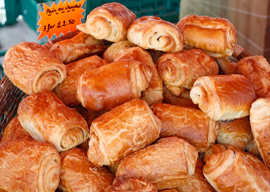
October 29, 2016

Source: Bigstock
Who would be a politician? It is like living in permanent fear of ambush, with everyone waiting to pounce on the first stupid thing that you say or do. To be a politician, therefore, you must be prepared to endure a thousand humiliations large or small for the sake of power. Which is one of the reasons, of course, why good people so seldom rise to the top in politics.
A man who hopes to be a candidate in the forthcoming French presidential elections, Jean-François Copé, was recently ambushed during a broadcast interview. The interviewer asked him the price of pain au chocolat, and of course he hadn”t the faintest idea: He hazarded a not-very-good guess at ten or fifteen centimes.
The question was designed to elicit precisely such an answer, to demonstrate that he was completely out of touch with the life of ordinary people and was therefore unsuitable for the presidency.
The answer was terrible because, as detractors soon pointed out, practically nothing these days costs ten or fifteen centimes. To go to the lavatory at Nîmes station, for example, costs seventy centimes. To make matters worse, M. Copé’s special area of expertise, or at least attention, is the economy.
It is not quite true, however, that you can buy nothing for ten or fifteen centimes. Though not motivated or driven by the strictest economic necessity, when I am in England I sometimes go down to my local supermarket just before it closes to see what items are on sale for next to nothing because their sell-by date expires an hour or two later and they would otherwise be thrown away. I may not particularly want pita bread, for example, but I find my desire or appetite for it suddenly stimulated by a price of two cents for ten. When I reach the pearly gates I shall not be able to point to many good deeds qualifying me for the kingdom of heaven, but I shall be able in all truth to say that I once bought two kilos of chicken legs for fifteen cents that made soup that lasted a week. In this way, I helped to save the planet.
Poor M. Copé! He said by way of explanation of his ignorance that he never bought pain au chocolat because he was careful of his figure. When prominent politicians are asked such questions as a test of their in-touchness, they should routinely multiply by ten the first figure they think of, as being the increase in prices since the last time they paid for a meal for themselves, or saw anything of the city in which they live other than from the back of an official car. Multiplying by ten should save them from ridicule.
Further and more detailed investigation showed, however, that M. Copé was more correct, no doubt by accident, than his sarcastic critics had supposed. It is true that if you buy pain au chocolat at a proper bakery it will cost about ten times more than the figure given by M. Copé, but the industrially fabricated version in cheap supermarkets costs about 20 centimes each, provided that you buy a packet of eight. What this revealed was that the interviewer had no more knowledge of the world of cheap supermarkets than had M. Copé of the price of pain au chocolat in boulangeries, though I doubt that M. Copé was familiar with the world of cheap supermarkets either.
Some ignorance of prices, therefore, is acceptable, while other ignorance is not. By their knowledge of prices shall ye know them. Perhaps it would be possible to rank politicians (or people in general) by the prices of which they are aware. Those who know the price of an Aubusson tapestry, for example, but not that of a pain au chocolat would be of aristocratic or industrialist conservative type; those who know the price of a pain au chocolat but not of a McDonald’s hamburger would be of good cultivated social democratic type; while those who know the price of Coca-Cola but not of fennel would be of the proletarian populist type. Political debates should be replaced by lists of goods of which the candidates estimate the current price.